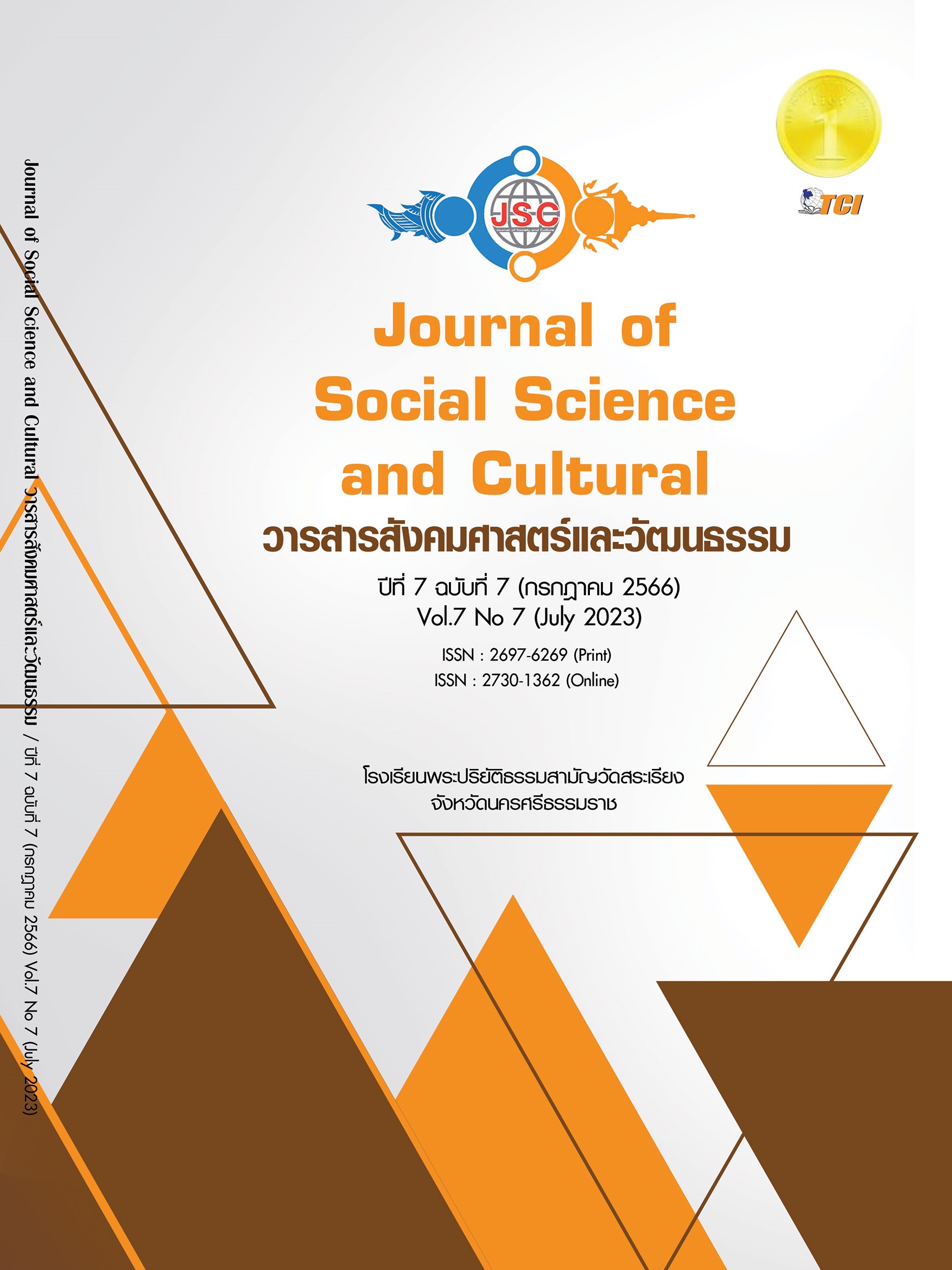A STUDY OF FACTOR AFFECT THE SUCCESS MANAGEMENT OF THAILAND VOLLEYBALL ASSOCIATION
Main Article Content
Abstract
The purpose of this research is to study the factors that affect the success in managing the Thai Volleyball Association. This research is a quantitative research that useing proportion stratified sampling according to the sample group type then simple sampling from the register of coaches, referees, and volleyball players, totaling 400 people. The tools used to collect data are questionnaires, statistical analysis, and multiple regression analysis. The research findings reveal that the factors with the highest average values are personnel, followed by competition management, structural organization, management, support, athlete development, sports science and technology, budgeting system, facilities and laws and regulations, respectively. The data analysis is conducted using descriptive statistics and regression analysis. The research findings reveal that the factor with the highest average value is personnel, followed by competition management systems and laws, rules, regulations with the lowest average value. The eight factors, ranked in descending order of importance, are management (X2), support (X5), personnel (X1), budgeting system (X3), athlete development (X10), competition management (X7), sports science and technology (X6), and laws, rules, regulations (X8), which significantly affect the success in managing the Thai Volleyball Association (Y) at a statistically significant level of .01. These factors together can explain 63.9% of the variance in the success of managing the Thai Volleyball Association (Adjusted R2 = 0.639, F = 110.370, p < .01). Thus, the equation for predicting the success in managing the Thai Volleyball Association can be written as follows: The equation of raw scores is the success in managing the Thai Volleyball Association=0.821+0.397management+0.313support + 0.298personnel+0.210budgeting system +0.166athlete development+0.156competition management + 0.132sports science and technology +0.128laws, rules, regulations. The equation of standard score is yˆ = 0.428X2+0.354X5 + 0.319X1+0.217X3+0.180X10+0.151X7+ 0.143X6+0.117X8.
Article Details
References
การกีฬาแห่งประเทศไทย. (2564). แผนพัฒนากีฬาแห่งชาติ ฉบับที่ 7 พ.ศ. 2565-2570. กรุงเทพมหานคร: การกีฬาแห่งประเทศไทย.
ชูศรี วงศ์รัตนะ. (2561). เทคนิคการใช้สถิติเพื่อการวิจัย. (พิมพ์ครั้งที่ 13). กรุงเทพหมหานคร: อมรการพิมพ์.
ฐานินี ปานปรีดา และสมทบ ฐิตะฐาน. (2562). การจัดการสโมสรกีฬาของสตรีที่ประสบความสำเร็จ. Veridian E- Journal, Silpakorn University ฉบับภาษาไทย สาขามนุษยศาสตร์ สังคมศาสตร์ และศิลปะ, 12(1), 736-754.
ธานินทร์ ศิลป์จารุ. (2563). การวิจัยและวิเคราะห์ข้อมูลทางสถิติด้วย SPSS และ AMOS. (พิมพ์ครั้งที่ 18). กรุงเทพหมหานคร: เอส. อาร์. พริ้นติ้ง แมสโปรดักส์.
ปวเรศร์ พันธยุทธ์. (2565). ปัจจัยที่ส่งผลต่อความสำเร็จของการจัดการกีฬาตะกร้ออาชีพเชิงธุรกิจ. วารสารวิชาการมหาวิทยาลัยการกีฬาแห่งชาติ, 14(2), 1-16.
ศิริชัย พงษ์วิชัย. (2564). การวิเคราะห์ข้อมูลทางสถิติด้วยคอมพิวเตอร์ : เน้นสำหรับงานวิจัย. (พิมพ์ครั้งที่ 27). กรุงเทพหมหานคร: สำนักพิมพ์จุฬาลงกรณ์มหาวิทยาลัย.
อนุรักษ์ปภพ มีตน และอาภรณ์ โพธิ์ภา. (2565). การวิเคราะห์ปัจจัยที่มีอิทธิพลต่อความสำเร็จในการแข่งขันกีฬาและการเรียนของนักศึกษา. วารสารการวัดผลการศึกษา มหาวิทยาลัยมหาสารคาม, 28(2), 337-352.
Best, J. W., & Kahn, J. V. (2014). Research in Education. (10th Ed.). Harlow England: Pearson Education.
De Bosscher, V. (2018). A mixed methods approach to compare elite sport policies of nations A critical reflection on the use of composite indicators in the SPLISS study. Sport in Society, 21(2), 331–355.
Eisinga, R., et ai. (2012). The reliability of a two-item scale: Pearson, Cronbach or Spearman-Brown. International Journal of Public Health, 58(4),637-642.
Erdfelder, E. et. al. (2009). Statistical power analyses using G* 3.1: Test for correlation and regression analysis. Behavior Research Methods, 41(4), 1149-1160.
Ferguson, J. (2021). Effective sporting organisations: A practitioner’s perspective. Open Journal of Social Sciences, 9(12), 167-211.
Hair, J.F. et. al. (2010). Multivariate Data Analysis (7th ed.). Pearson-Prentice Hall: New York.
Hasanzadeh, N., et al. (2023). Factors affecting the development of sports entrepreneurship (case study: Ardabil province in Iran). Journal of New Studies in Sport Management, 4(2), 752-764.
Jacobs, S. et al. (2021). Contextual factors influencing the South African elite sporting system: an ‘open system’ approach. International Journal of Sport Policy and Politics, 13(4), 699-714.
Keihan, S. et al. (2023). Developing a structural pattern of E-commerce in Iran sport businesses. Journal of Advanced Sport Technology, 7(1), 1-8.
Lovell, T.W.J. et. al. (2019). Factors affecting sports involvement in a school-based youth cohort: Implications for long-term athletic development. Journal of Sports Sciences, 37(22), 2522-2529.
Mthombeni, S. et al. (2023). Factors promoting and hindering sporting success among South African former Olympians from historically disadvantaged areas. South African Journal of Sports Medicine, 35(1), 1-9.
Nasr Esfahani, D. & Rahbari, S. (2022). Identifying the factors affecting the establishment of knowledge-based sports companies based on electronic knowledge: A qualitative analysis. Journal of New Studies in Sport Management, 3(3), 530-543.
Peake, R. & Davies, L.E. (2022). International sporting success factors in GB para-track and field. Managing Sport and Leisure, doi:10.1080/23750472.2022.2046487.
Rattanapian,P. et al. (2018). Factors influencing achievement of regional league division 2 football tournament management. Kasetsart Journal of Social Sciences, 39(3), 542-549.
Ronna C. T. & Laurie C. (2003). Indexes of item-objective congruence for multidimensional items. International Journal of Testing, 3(2), 163-171.
Tatari, M. et al. (2021). Identify and prioritize the factors affecting the success of the federation of bodybuilding and fitness strategies. Research in Sport Management and Marketing, 2(2), 72-83.


